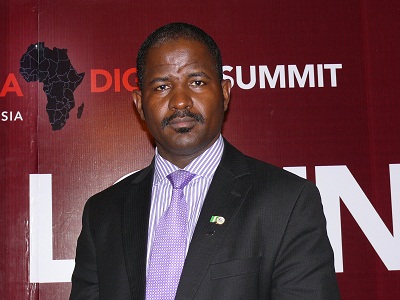Q&A: Nigerian Communications Commission’s Dr Bashir Gwandu
During the Innovation Africa Digital Summit in Ethiopia, IT News Africa had the opportunity to talk to Dr Bashir Gwandu, Nigeria’s Communications Commission’s Executive Commissioner. Gwandu discussed the future of mobile devices in Nigeria, content creation and the country’s recent efforts to free up spectrum.

Dr Bashir Gwandu, Nigeria’s Communications Commission’s Executive Commissioner (image: Charlie Fripp)
* Please elaborate on the need to free up spectrum in Nigeria?
What we realized is that we don’t have fiber on the ground; and that we don’t even have as much copper as we need. So we asked ourselves what infrastructure will allow for communication – and the only solution that we can have is wireless- and the most important resource to allow that communication is spectrum.
We have a growing requirement for data with a lot of content coming out of Nigeria. Going into the future, we will need a way of transmitting this content to the population and indeed other parts of the world. Now, if you don’t have fiber or copper underground, you have to have an alternative. If you go and ask for spectrum now, you won’t get it and we don’t have it. Every spectrum that is being identified by the ITU (International Telecommunications Union) becomes harmonised around the world, making it lucrative – because infrastructure will be developed for it. So what we went to the ITU for, is to prepare for the future. Its not just about content, but the ability to actually use your mobile as a partner- to purchase products at a shop instead of using a debit or credit card.
To prepare for the future, we have to create infrastructure that will make that kind of thing available and one of them is spectrum. There are technologies around, for example improving spectral efficiency is one way to improve data speed – but there is only so much you can do because you can have LTE but that is still not enough. The second alternative is to go back to erecting more towers, but that is more costly and there is an environmental impact- so clearly that is not the best option for us. The third alternative is co-location of towers, but you can only use that to a degree because not every tower can be co-located. So by far, the most important and effective way to improve the potential of being able to accommodate the higher data demand, is to free up some spectrum.
* It has been reported that Nigeria creates the second largest amount of content in the world? Where does this content come from?
That is what has been mentioned, I hope that is correct. We have many movies that we have created in Nigeria; I think that is where this is coming from. We have more movie content, and future content will also be movies, videos and so on. I can agree that we are maybe the second or third largest content creator, because of the number of movies that are coming out of Nigeria.
Which content should we be focusing on?
Other content like software and development, we are not at the level at which I want to see. I want to see us better in terms of producing software, in terms of the evolution of hardware – we are not there yet. But in terms of the content that people can buy on the internet, yes Nigerians are very good at it – probably the number one player in Africa. To prepare for all of this is difficult, because if you want to download a movie in Nigeria today, you will be very frustrated because there internet speed is poor. So that is where we are, and you have to look ahead and have the vision to prepare for the future- and that is why we went to ask for the extra bandwidth spectrum.
* Is Near-Field Communication an option for Nigeria in the future?
This is a combination of so many things – we have RFID (Radio Frequency Identification) technology in Nigeria, which has to be built into the product. In the shops, they have RFID stickers that give customers information about products such as expiry date and price. What we are hoping to see is that phones will be designed in such a way that they actually read RFID. If the shelves are automated, it can group all your purchases together outside the shop. But naturally it will need to have short-range communication like Bluetooth. In the proposal that we have tabled with the ITU (International Telecommunications Union), we have asked for spectrum for these other improvement services. And that will include Wi-Fi for SRD (short-range devices).
* What is the future of mobile devices and usage in Nigeria?
The future of the mobile industry, I think, as more people get connected and our lives become more digital, we will have more efficient services. We will continue to rely on mobile as part-and-parcel of our lives, and we’ll one day see cars talking to each other using spectrum. In time, RFID technology will be part of our lives in such a way that you will know the location of many different things. These things are coming; it is just a matter of time. There is a very bright future ahead, and our lives will be managed more efficiently. We are thinking ahead – as regulators in Nigeria we are really among the people who think ahead, so that we give our people the best chance at making efficient use of their time and resources.
Charlie Fripp – Online editor






































